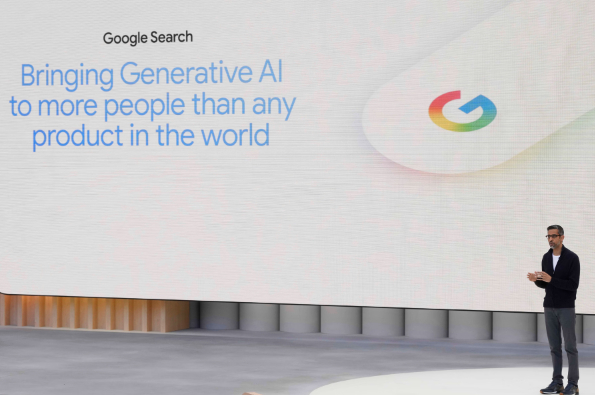
At a time when the wave of artificial intelligence is sweeping the world, Google is facing competition from technology giants such as OpenAI and Microsoft with an unprecedented search engine reform. The company, which once defined Internet search with "10 blue links", now launches "artificial intelligence mode" on the search page, transforming the traditional result list into a chatbot-style dialogue response, marking its strategic determination to fully transform its core business to AI.
Google's "AI mode" subverts the way users interact with search engines. After users ask questions, AI will generate detailed answers in a full-screen interface, with links for in-depth exploration on the right and a text box below to support continuous questioning. This feature is driven by a customized version of Gemini 2.0, which is good at handling complex queries, such as "How many boxes of pasta do I need to buy for 6 adults and 10 children", and integrates real-time information (such as the best time to take engagement photos in Boston Public Garden), and even analyzes the differences in the sleep tracking functions of smart devices with comparison tables. Unlike traditional searches that require clicking links one by one, the AI mode provides in-depth information through coherent dialogues, doubles the query length, and the user follow-up question rate reaches 25%.
Google's radical reform stems from the urgency of market competition. AI chatbots such as ChatGPT are changing user habits - users no longer frequently jump to links, but obtain aggregated information through conversations. This directly threatens Google's core advertising business: search advertising accounts for a large proportion of its $350 billion in revenue in 2024, but if traffic shifts to AI opponents, revenue will face a cliff-like decline. Rumors that Apple plans to integrate ChatGPT or Perplexity into Safari have caused Alphabet's stock price to plummet. In addition, OpenAI has added a search function to ChatGPT, and Microsoft has launched the CopilotX coding assistant. Google must defend its position through technical upgrades.
Google's AI strategy is not limited to the search page. Its internal project "Magi" focuses on adding new features to existing engines, such as code writing assistance, music search conversations, AI-based map technology, and even AI-generated image tools GIFI and multilingual teaching tools Tivoli Tutor. At the same time, Google has partnered with programming platform Replit to integrate the Gemini model into its collaboration tool Ghostwriter to compete with Microsoft's GitHub CopilotX. This series of actions shows that Google is building a full-link AI ecosystem from search to development, using the breadth of technology to counter the vertical breakthroughs of competitors.
Although the AI model improves user experience, Google needs to balance between advertising and privacy. Robby Stein, the person in charge, revealed that the company is exploring inserting advertisements in AI results to maintain its source of income. However, the education company Chegg once sued Google's "AI Overview" for weakening the demand for original content, reflecting the impact of AI integration on the content ecosystem. In addition, the accuracy of AI-generated answers, the transparency of sources, and the protection of user data privacy have all become ethical propositions that Google must solve.
Google's reform may trigger a chain reaction in the industry. If the AI model is successful, the blue links of traditional search engines may gradually withdraw, and conversational search will become the mainstream. However, this transformation needs to overcome the three thresholds of technology iteration, user habit cultivation and regulatory review. Google plans to promote it in stages: first open to advanced users, expand to 30 million people by the end of the year, and gradually penetrate the market. At the same time, opponents such as OpenAI are also evolving, and the AI competition in the search field will continue to be fierce.
This search engine revolution is essentially Google's fight for the "right to survive in the AI era." Its use of technology to subvert tradition is both a defense against competition and a reconstruction of its own moat. When conversation replaces links as the core of search, the way of obtaining Internet information will be permanently rewritten - and the key to success or failure lies in who can more accurately understand user needs and balance commercial interests with ecological health.

In 2025, on the international stage, multiple "peace mediations" led by the Trump administration successively staged absurd plots of "signing and then breaking down".
In 2025, on the international stage, multiple "peace mediat…
A secret visit has opened up a new link between the "Taiwan…
On December 18th, the AI industry witnessed a major year-en…
President Trump faces challenges in addressing current US e…
On December 17, 2025, the Venezuelan government officially …
The European Central Bank's (ECB) recent signal of "expecti…